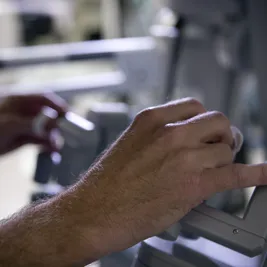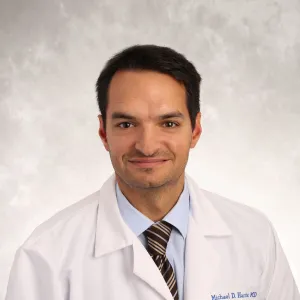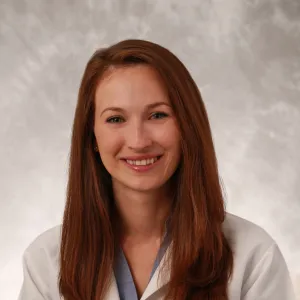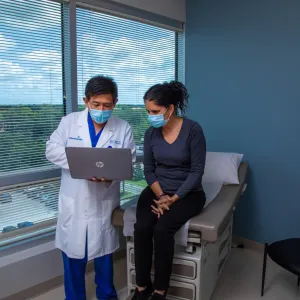
Advanced Endoscopy for Pancreas, Gallbladder and Bile Duct Conditions
An ERCP (endoscopic retrograde cholangiopancreatography) is an endoscopic procedure used to treat problems of the bile duct (biliary tree) or pancreatic duct.
ERCP often be a less invasive alternative to surgery to treat conditions such as:
- Gallstones or pancreatic stones
- A narrowed bile or pancreatic duct
- Infections in the gallbladder or pancreas
- Fluid that needs to be drained from these areas
- A suspicious mass that needs to be biopsied
- Pancreatitis, chronic or acute
- Bile duct leaks
WHAT ERCP INVOLVES
ERCP requires fasting from food and drink for several hours beforehand. Some patients may need to stop taking certain medicines. The patient is sedated, and a gastroenterologist feeds an endoscope down the throat to the upper part of the small intestine (duodenum). A small amount of air is used to inflate the duodenum to make it easier for the doctor to see the area where the bile duct and pancreatic duct are located. However, the endoscope is too large to enter the bile and pancreatic ducts. So ERCP uses fluoroscopy, a type of X-ray that allows the doctor to see the duct and any blockages on a monitor.
USES OF ERCP
- Treatment of blocked ducts. A thin tube and wire from the tip of the endoscope fit inside the ducts and are used to correct the problem. These instruments can dislodge stones or place a plastic or metal stent to open a narrowed duct.
- Biopsy. ERCP can be used to take fluid or tissue samples for biopsy.
- Endoscopic sphincterotomy. ERCP can help the doctor remove part of the valve between the bile and pancreatic ducts and small intestine (the sphincter of Oddi), so a gallstone or pancreatic stone can pass through.
RISKS ASSOCIATED WITH ERCP
The risks of ERCP are similar to those of other endoscopic procedures and include a small risk for bleeding, tearing of the digestive tract and infection. Also, inflammation of the pancreas (pancreatitis) or gallbladder (cholecystitis) can occur. These risks are decreased when receiving care from a physician highly experienced in ERCP like the ones at the AdventHealth Digestive Health Institute.
Endoscopy Services
-
Upper Endoscopy / Esophagogastroduodenoscopy (EGD)
An upper endoscopy helps doctors look at the esophagus, stomach and first part of the small intestine and can help diagnose a range of conditions.
-
Capsule Endoscopy and Deep Enteroscopy
A capsule endoscopy allows doctors to see into the small intestine, which can be important in diagnosis gastrointestinal bleeding, polyps and cancer.
-
Colonoscopy / Flexible Sigmoidoscopy
A colonoscopy or sigmoidoscopy is a way for doctors to see inside the colon and rectum to identify issues and perform biopsies.
-
Endoscopic Retrograde Cholangiopancreatography (ERCP)
Doctors at AdventHealth Digestive Health Institute use ERCP for Pancreas, Gallbladder and Bile Duct Imaging and Advanced Endoscopic Treatment.
-
Endoscopic Ultrasound (EUS)
Endoscopic Ultrasound. Comprehensive health services are offered at AdventHealth Digestive Health Institute. We are invested in your long-term health goals.
-
High Resolution Anoscopy (HRA)
Colorectal Surgeons at AdventHealth Digestive Health Institute are HRA Providers (High Resolution Anoscopy) for Anal Cancer Screening.
-
Acid Reflux Measuring Tests
Doctors at the AdventHealth Digestive Health Institute Mickle Center for Reflux and Esophageal Conditions use outpatient tests to measure Acid Reflux.

Recover Faster With Minimally Invasive and Robotic Surgery
All the surgeons at the Digestive Health Institute (DHI) have a large depth of experience in offering minimally invasive surgery.
Meet The Experts

Michael Harris
MD
Gastroenterologist

Marian Hanhan
PA-C, MPAS
Physician Assistant

Christina Hill
MPH, PA-C, MMS
Physician Assistant

Justin R. Lawandales
MPH, MSN, ARNP
Nurse Practitioner

Surgical Consultations For Digestive Cancer Without The Wait
Appointments Within Five Days for Patients with Cancer
At AdventHealth Digestive Institute, we know that after being diagnosed with cancer, patients want and often need to begin treatment quickly. So we make it a priority to offer appointments for cancer surgery consultations within five business days, and often earlier.
Patients who are newly diagnosed with cancer, or have just found out they have cancer again, qualify for this priority access. Our surgeons will make themselves available to see you right away, even for a second opinion. We want to help you start your treatment as soon as possible.
News and Info
-

-

-

-
 Blogs
BlogsDigestive Institute Tampa Surgeon Appointed to Advisory Board of Robotic Surgeons
Estimated read time: -
 Blogs
BlogsSafeguard Your Colon Health: Get The Facts about colorectal cancer screening tests
Estimated read time: -

